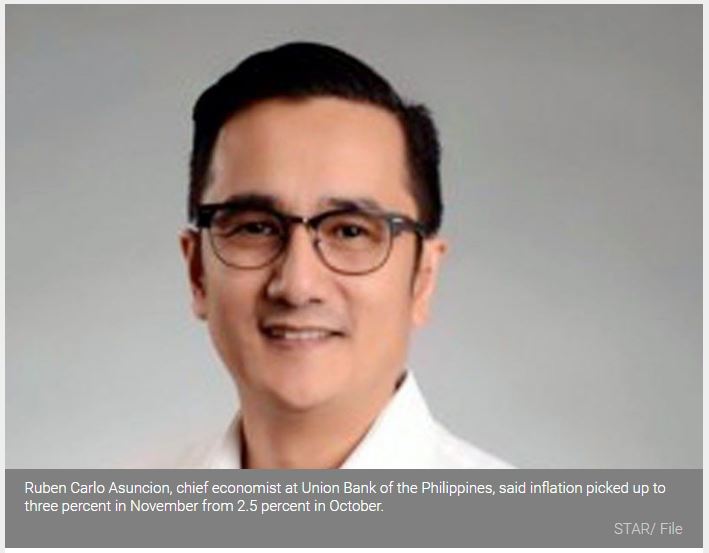Philippines: Inflation likely picked up anew
Based on poll of bank economists
MANILA, Philippines — Inflation likely accelerated for the second straight month in November due to higher oil prices as well as an uptick in food prices due to the damage caused by the typhoons, according to bank economists.
Ruben Carlo Asuncion, chief economist at Union Bank of the Philippines, said inflation picked up to three percent in November from 2.5 percent in October.
“We think that the typhoon-induced food price upticks, particularly in the Luzon area, can augment the monthly headline inflation by 0.5 percentage point. We have derived this estimate from historical data analysis of a mix of the country’s costliest typhoons from 2009-2018 and particular regional monthly food inflation of rice, fish, fruits and vegetables,” Asuncion said.
He said these commodities account for about 19.3 percent of the total inflation basket.
“The specific food price upticks due to previous typhoons are considered to be one-offs as observed from our data analysis,” Asuncion said.
He said eventual price corrections could be rapid for some like ‘Ompong’ in September 2018 and could be slower for others like ‘Yolanda’ in November 2013.
He expects another uptick in December following the clustering of typhoons method.
“It is also important to point out that global oil prices have been on an eighth-month high and this development should also support the view of a higher uptick in the November inflation print,” Asuncion said.
Security Bank chief economist Robert Dan Roces said headline inflation averaged 2.7 percent as prices of food products particularly vegetables and fruits went up as a result of supply disturbances from the recent typhoons, while pork prices are also higher as producers struggle with cases of African swine fever (ASF).
Roces said oil prices have also gone up as major players implemented upward price adjustments last Nov. 17. The high base from last year tempered the upward price pressures in November.
“If realized, average inflation year-to-date will remain at 2.5 percent which has been the case since May of this year; this validates a benign inflation environment and relatively muted consumer demand,” Roces said.
The Security Bank economist said he expects inflation to average 2.5 percent this year.
Rizal Commercial Banking Corp. chief economist Michael Ricafort said inflation averaged around 2.7 percent due to typhoon damage largely brought about by ‘Ulysses’ and ‘Rolly’ as well as higher oil prices.
Ricafort said offsetting positive factors include the strong peso and relatively slower pick up in the local economy amid social distancing and other stringent health protocols.
He said the benign inflation environment could result in further monetary easing by the Bangko Sentral ng Pilipinas (BSP) with the further lowering of the reserve requirement ratios for banks in December.
“Thus, the limited government funding for economic/fiscal stimulus measures necessitate more heavy lifting through additional monetary easing measures as seen recently, as the economy still needs all the support measures it could get amid the economic challenges largely brought about by the COVID-19 pandemic, as well as help improve economic recovery prospects, at the very least,” Ricafort said.
Ricafort said inflation could still ease by December to February next year to a little over or even slightly below two percent, largely due to higher base effects.
Source: https://www.philstar.com/business/2020/11/29/2060121/inflation-likely-picked-anew


 Thailand
Thailand




